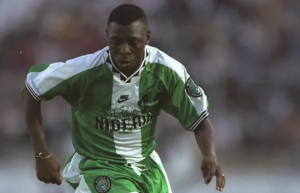
Teslim Fatusi Switzerland-based winger, Serviette and Polonia Warszawa star. Born 1978, Fatusi plied his trade in Tunisia, Germany, Belgium, Hungary, Poland, Switzerland, South Africa, Saudi Arabia and Vietnam before calling it quits with active football in 2008, declining to follow his ex-teammates into coaching. Fatusi’s career took a dive after his gold gift to Head of State, General Sani Abacha who was unpopular. He ran out of luck again when he was robbed in Lagos, losing money and vital documents in manners that would impact his life. His first marriage collapsed shortly after. The last time Fatusi donned the national colours was in a friendly match between Mozambique and Nigeria in Maputo in 1999. After the encounter watched by former President, Olusegun Obasanjo, Fatusi, who was playing for South African club Mamelodi Sundowns then, fell into oblivion and it took his brief return to the domestic league with Ibadan side Shooting Stars in 2005 to remember that he played for the country in the past.
Fatusi was favourite for a starting role at the Atlanta ’96 Olympic Games after he emerged as the national U-23 team’s leading scorer during the qualifiers. But when Nigeria played their Group D opening game against Hungary in the men’s football tournament of the Atlanta Games on July 21, 1996, Fatusi was surprisingly dropped to the bench by coach Jo Bonfrere. Fatusi found himself in the same situation when the team beat Japan 2-0 two days after defeating Hungary 1-0. He finally got his chance to play in the tournament when he replaced Tijani Babangida in the 81st minute against Brazil on July 25. Nigeria lost the encounter after the Dream Team could not find an answer as Ronaldo’s 31st minute gold helped the South Americans claim three points to top the group. His electrifying runs and deft touches were the hallmark of his game and he made a big impression in the encounter. The former Stationery Stores of Lagos forward was a second-half substitute in the 2-0 defeat of Mexico in the quarterfinal, when he came in for captain Nwankwo Kanu in the 66th minute. Nigeria beat tournament favourites Brazil 4-3 in the semifinals and went ahead to post a 3-2 victory in the final against another South America powerhouse Argentina to grab gold at the Sanford Stadium, Athens, Georgia. A sellout crowd of 86,117 attended the game on August 3.
Fatusi who did not play in the final, however stole the show when Head of State General Sani Abacha hosted the team. It was the first time any African country would win the men’s Olympic football gold medal. At a ceremony to reward the team and other athletes who won medals at the Olympics, Fatusi sensationally handed his gold medal to Abacha. While the former ASEC Mimosas player earned presidential plaudits for his golden gift, he came under sharp attacks from many Nigerians, and it marked a turning point in his career. The Abacha administration was unpopular for its human rights abuses, including the hanging of Ken Saro- Wiwa, the muzzling of the media and detention of the acclaimed winner of the June 12,1993 presidential election, MKO Abiola. Believing this to be the reason for the discontent he suffered from the authority who judged his action as trying to cury favour from the Head of State, Fatusi recollected that he went to Aso Rock where he met Al Mustapha, Abacha’s Chief Security Officer who gave him back his gold medal. Accroding to him, he wasn’t given any extra money by the government for presenting his gold medal to Abacha. Mustapha only asked him to come back to see the Head of State, which he never did.
Although Fatusi was promoted along with his teammates to the Super Eagles after the Federal Government rewarded each member of the victorious Olympic team with Nim, he was a peripheral figure in the squad. Fatusi only featured for the country in qualifiers and unrated tournaments despite his top form. He was denied a place in the France ’98 World Cup, 2000 Africa Cup of Nations and the Sydney 2000 Olympic Games squads. This might have been in some way responsible for his inability to attract interest from top European clubs. Fatusi was dropped from the Sydney 2000 Olympics squad because coach Confrere was under pressure from some officials of the NFA not to take him there. Bonfere had assured him that he would be in the squad as he was playing very well in Belgium (at Roeselare). He was excluded from the final selection because the NFA claimed he was overage. They later said he was not invited though he was 19 when he played at the Atlanta Games in 1996, which means he was 23 years in 2000 and still within the age bracket. Football at the Olympics is an II-23 tournament and he was qualified to play. When he complained, the NFA officials said they weren’t aware of his invitation despite giving me him a letter to that effect. He walked away and decided to lie low[i].
[i] Punch June 8, 2013
